
Education stands as the cornerstone of societal progress and individual empowerment. Nelson Mandela once said, “Education is the most powerful weapon which you can use to change the world.” This profound statement encapsulates the transformative power of education. Investing in education is not merely a societal obligation but a strategic imperative that yields substantial benefits for individuals, communities, and nations.
One of the most significant impacts of education is on economic growth. Countries that invest heavily in education often experience robust economic development. Take South Korea, for example. In the 1960s, South Korea was an impoverished nation with limited resources. However, by prioritising education and investing heavily in it, the country transformed itself into a global economic powerhouse. Today, South Korea boasts one of the highest literacy rates in the world and is home to leading technology companies like Samsung and LG. The country’s investment in education has paid off, resulting in a highly skilled workforce that drives innovation and economic growth.
Education is a powerful tool in the fight against poverty and inequality. When individuals have access to quality education, they are better equipped to secure well-paying jobs and improve their standard of living. The World Bank reports that each additional year of schooling can increase a person’s income by an average of 10%. In Rwanda, the government’s commitment to universal education has led to significant reductions in poverty rates. By ensuring that all children, regardless of their background, have access to education, Rwanda has made substantial progress towards closing the inequality gap and fostering social mobility.
Education also has a profound impact on health and well-being. Educated individuals are more likely to make informed decisions about their health, leading to better health outcomes. For instance, in Kenya, women who have received education are more likely to seek prenatal care and have their children vaccinated. This has led to a significant decrease in child mortality rates and improvements in maternal health. Moreover, educated populations are better equipped to combat diseases and health crises, as evidenced by the response to the Ebola outbreak in West Africa. Countries with higher literacy rates were more effective in disseminating information about the virus and implementing preventive measures.
An educated populace is fundamental to the functioning of a vibrant democracy. Education fosters critical thinking, informed decision-making, and active civic participation. Finland, known for its high-quality education system, also enjoys high levels of political engagement and transparency. Finnish citizens are well-informed about their rights and responsibilities, contributing to a robust democratic process. Education empowers individuals to hold their governments accountable and participate meaningfully in the democratic process, leading to more stable and just societies.
Education is the bedrock of innovation and technological advancement. Countries that invest in education, particularly in science, technology, engineering, and mathematics (STEM), are better positioned to lead in technological innovation. The United States, with its world-renowned universities and research institutions, has been at the forefront of technological advancements for decades. Companies like Google, Apple, and Microsoft are testaments to the power of education and innovation. By fostering a culture of learning and inquiry, these companies continue to drive technological progress and economic growth.
Education also plays a critical role in promoting environmental sustainability. Educated individuals are more likely to understand the importance of protecting the environment and adopting sustainable practices. In Costa Rica, education initiatives focused on environmental conservation have led to significant reforestation efforts and the development of sustainable tourism. As a result, Costa Rica has become a global leader in environmental sustainability, with nearly 30% of its territory designated as protected areas. Education has empowered citizens to take action to preserve their natural heritage for future generations.
The importance of investing in education cannot be overstated. Education is a powerful catalyst for economic growth, poverty reduction, health improvements, democratic participation, innovation, and environmental sustainability. The live examples from South Korea, Rwanda, Kenya, Finland, the United States, and Costa Rica illustrate the transformative impact of education on individuals and societies. As we move forward, it is imperative that governments, businesses, and communities continue to prioritise and invest in education. By doing so, we can build a brighter, more equitable, and prosperous future for all.
Let us champion education, recognising it as the key to unlocking the potential of every individual and the foundation upon which we can build a better world.